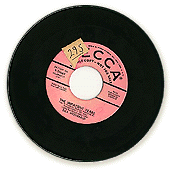|
It's stupefying to think that so much of the future of American music hung in hands of frivolous collegiates.
But more importantly, how do we gage how quickly Webb went from only begrudgingly hiring Fitzgerald to, within a few months, all but turning his band into an exclusive showcase for her?

 Born in Baltimore in 1907, Chick Webb's spine had been smashed in a tragic accident during his early childhood, leaving him to grow up hunchbacked. He bought his first set of traps at age 11, and from the time he wrapped his powerful fingers around a drumstick it was a foregone conclusion that he would be the most sought-after drummer in Maryland and then New York, where he moved in 1924. He had never thought of becoming a bandleader - this being long before Gene Krupa glamorized both occupations - but once Duke Ellington and others talked him into it, having the greatest orchestra in the world became as much an obsession for Webb as being the supreme percussionist. Webb consistently hired the best sidemen and commissioned the most appropriate arrangements even when he couldn't very well afford to. Born in Baltimore in 1907, Chick Webb's spine had been smashed in a tragic accident during his early childhood, leaving him to grow up hunchbacked. He bought his first set of traps at age 11, and from the time he wrapped his powerful fingers around a drumstick it was a foregone conclusion that he would be the most sought-after drummer in Maryland and then New York, where he moved in 1924. He had never thought of becoming a bandleader - this being long before Gene Krupa glamorized both occupations - but once Duke Ellington and others talked him into it, having the greatest orchestra in the world became as much an obsession for Webb as being the supreme percussionist. Webb consistently hired the best sidemen and commissioned the most appropriate arrangements even when he couldn't very well afford to.
 After manager Moe Gale appointed Webb the resident band of his Savoy Ballroom, the group became immediate home-town favorites in Harlem. However, even Webb's miraculous drumming was not the right sort of a vehicle with which the band could draw attention from south of 125th Street, such as Ellington's string of song hits or Cab Calloway's personality, with which Irving Mills was able to promote those bands into celebrity-hood. However, once Fitzgerald began singing with Webb, the leader realized that here was an attraction that not only fit in 100% with what he was doing musically, but could provide the vehicle for the band as a whole to break into the mainstream. After manager Moe Gale appointed Webb the resident band of his Savoy Ballroom, the group became immediate home-town favorites in Harlem. However, even Webb's miraculous drumming was not the right sort of a vehicle with which the band could draw attention from south of 125th Street, such as Ellington's string of song hits or Cab Calloway's personality, with which Irving Mills was able to promote those bands into celebrity-hood. However, once Fitzgerald began singing with Webb, the leader realized that here was an attraction that not only fit in 100% with what he was doing musically, but could provide the vehicle for the band as a whole to break into the mainstream.
 Fitzgerald trips up on the bridge the tiniest little bit on her first recording, "I'll Chase the Blues Away," but still sounds remarkably polished for one who had recently turned 17. In fact, any awkwardness on these early sides comes less from Fitzgerald than from substandard craftsmanship on the part of the grade-B songwriters whose works the band was frequently importuned to record (the less worthwhile examples of which have been excluded from this set). The things would be hard enough to sing at a more breathable tempo, but at the rapid lindyhop pace that the dancers demanded would surely defeat any vocalist who was less than an Ella Fitzgerald. Fitzgerald trips up on the bridge the tiniest little bit on her first recording, "I'll Chase the Blues Away," but still sounds remarkably polished for one who had recently turned 17. In fact, any awkwardness on these early sides comes less from Fitzgerald than from substandard craftsmanship on the part of the grade-B songwriters whose works the band was frequently importuned to record (the less worthwhile examples of which have been excluded from this set). The things would be hard enough to sing at a more breathable tempo, but at the rapid lindyhop pace that the dancers demanded would surely defeat any vocalist who was less than an Ella Fitzgerald.
 
 This site rescued by media.org. This site rescued by media.org.
|




![]() This site rescued by media.org.
This site rescued by media.org.

